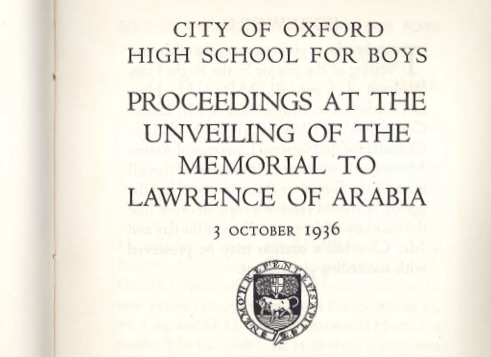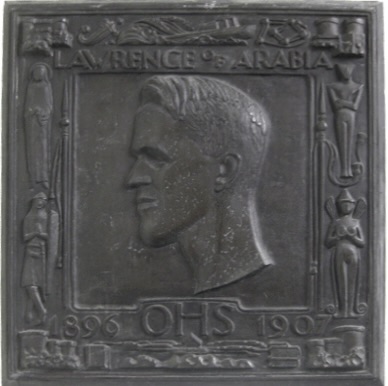This post and its companions present a full record of everything you need to know about what happened on 3 October 1936, on the school stairs leading up to the hall. All the content comes from memorial booklets published at the time.

‘October the third 1936 was a great day in the history of the School. At 11.15 a.m. the Hall, suitably decorated, was filled with the boys and guests.
While a reception was being held in the Headmaster’s room by Alderman F. W. A. Bennett, Chairman of the Governors, L. C. J. Griffin, Captain of Lawrence House, read ‘Let us now praise famous men’ from Ecclesiasticus 44, vv. 1-15, and D. G. Remington recited Herrick’s poem, ‘His Cavalier’.
At 11.30 three trumpeters of the Royal Air Force sounded a fanfare, and Mr. Churchill unveiled the plaque in the presence of some fifty guests, these having taken their seats in the Hall: the Mayor of Oxford (Councillor Mrs. Townsend), the Pro-Vice-Chancellor (the Principal of Jesus College), the Headmaster (J. E. Badham, Esq., M.A.), the President of the Old Oxford Citizens Society (H. M. Lodge, Esq., Hon. M.A.), the Right Hon. Winston S. Churchill, and the Chairman of the Governors, passed in procession to the platform.’
The Churchill Speech
As indicated in the programme above, the speech for the unveiling of the plaque in memoriam of Lawrence of Arabia was made by the Rt Hon Winston Churchill, admirer and friend of T.E.Lawrence.
It is worth remembering that, at this time, Churchill was not in a ministerial position and was politically isolated, having been excluded from the government due to his opposition to the Conservative leadership and his controversial views on issues like Indian independence. He was also actively speaking out against appeasement policies towards Nazi Germany, which were unpopular at the time, and was seen as a politically marginalised figure.
You can read the full text of Churchill’s speech here.
Response by The Headmaster, Mr J. E. Badham
Closing remarks by the Chairman of Governors
‘MR. CHURCHILL was then loudly applauded, and bowed his acknowledgement. The Royal Air Force trumpeters again sounded a fanfare and the whole company sang the first verse of the National Anthem.’
